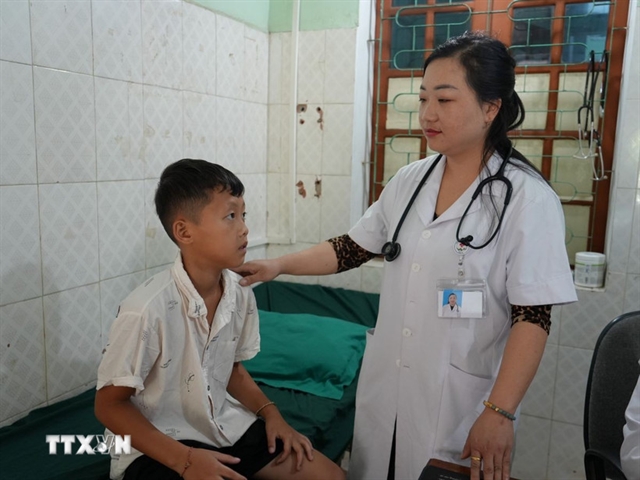 Society
Society

Phạm Thị Huyền Trang was just 21 years old when she joined the team of call responders at Ngày mai (Tomorrow) mental health hotline a year ago, where she and other volunteers assist people seeking help with their mental health.

|
| Phạm Thị Huyền Trang responds to calls to Ngày mai (Tomorrow) mental health hotline. — Photo courtesy of Phạm Thị Huyền Trang |
HÀ NỘI — Phạm Thị Huyền Trang was just 21 when she joined the team of call responders at Ngày mai (Tomorrow) mental health hotline a year ago, where she and other volunteers assist people seeking help with their mental health.
The Psychology student from the University of Social Sciences and Humanities will answer calls from people with mental health difficulties – some of whom exhibit self-harm or suicidal thoughts.
Trang once received an “odd” call – there was only silence from the other side when she picked up the phone.
With what she had learned through training, Trang did not hang up immediately. She continued talking and saying encouraging words to help the caller open up.
The silence continued for another minute until a voice replied.
The caller’s story was told amid the sounds of sobbing. Trang waited for the girl while she cried, guiding her to take a deep breath to calm down.
Trang said: “She felt like she was not respected or loved. Her parents constantly scolded her.
“And because she is still dependent on her family, she could not change her living environment.”
Speaking to Vietnamnet e-newspaper, Trang said that the cases that volunteers like her receive don't necessarily require a solution.
“Most of the time, we listen, share, acknowledge the emotions and problems that the caller is going through. That is very important to them.”
It is because many people who are diagnosed with depression or experiencing mental health issues are not being listened to or understood by those closest to them.
There are still numerous people who think these emotions are a weakness or a facade, instead of seeing it as a difficult medical condition.
Trang and her fellow volunteers also receive a substantial number of calls from friends and family of the depressed.
Anxious and helpless, a mother once called Trang after three years of accompanying her child in her fight against mental illness.
From a good student who got a stable job out of university, her child increasingly experienced worrying signs that forced her to quit her job to focus on treatment.
After some time taking medication, the girl ate and slept better, but she still locked herself in the house, not wanting to go anywhere, talk to anyone or do anything in the house.
The mother wanted to take her child to therapy, but the girl refused. Distressed, she sought help from those who are ready to listen, like Trang.
“Depression is still a relatively strange condition and receives little empathy in Việt Nam. Many patients or their families don’t receive support or are not listened to.”
“If they do, it is usually half-hearted advice or judgement. That’s not what the patients want to hear, and can even have a negative effect.”
Trang knows that what she is doing cannot replace orthodox treatment like medication or therapy.
However, sharing and acknowledging the pain of the patients is an important psychological factor. At least it helps the ones in need get out, or strive to get out of the negative state of mind at that moment.
22-year-old Trang sets out for herself standards higher than listening and empathy.
“As I am a Psychology student, I always want to help the patients better.
“However, many cases are out of my ability and powers. In each of those cases, after ending the call, I always ponder and hypothesise what would I do if I become a psychological therapist.”
“It is also my motivation to study and improve my expertise to better support patients.”
Sometimes Trang ended a shift being affected by the heavy thoughts of the caller. In addition to talking about her feelings with other volunteers, Trang also practises writing down what she feels at that moment.
The job, on the other hand, helped improve her active listening skill and develop a more open view of the problems she herself is having.
“I feel happy because I’m doing something meaningful and positively contributing to the community, especially in terms of mental healthcare for people,” said Trang.
Trang is one of the 22 volunteer responders at Ngày mai (Tomorrow) hotline, a project founded by Dr Đặng Hoàng Giang and psychology expert Nguyễn Hà Thành in May 2021. The objective is to receive information and provide free psychological consultancy to those who are in a mental crisis, especially with depression. — VNS




